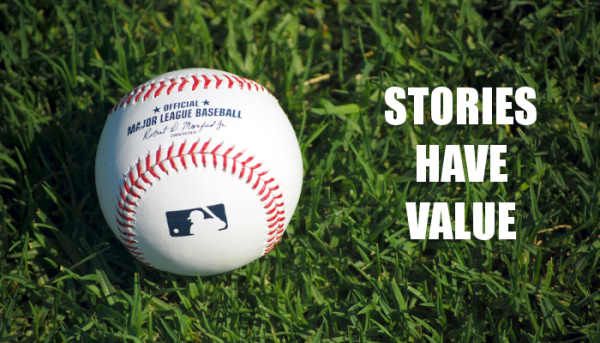
Marketers look for ways to differentiate their products from the rest. When representing a product with an unmatched capability, the job is easy. But, more often than not, marketers represent products that are similar to a competitor’s offering. Business storytelling is applicable at moments like these because the stories associated with a product are unique and unique stories have value.
Consider a baseball. All Major League baseballs are manufactured to the same specifications.
- All weigh between 5 and 5.25 ounces
- All have a circumference between 9 and 9.25 inches
- All are wrapped with two strips of rawhide that are held together by 108 double stitches.
Essentially, baseballs are a commodity that we can buy online for $19.99.
But, if each baseball is indistinguishable from any other, why would someone pay significantly more than $19.99 for one? The answers depend on the stories attached to them.
For example, someone paid $3 million for Mark McGwire’s 70th homerun ball. Someone else paid $418,250 for the ball that dribbled between Bill Buckner’s legs, allowing the New York Mets to advance to Game Seven and beat the Boston Red Sox in the 1986 World Series.
In Rhetoric, Aristotle describes the three components of persuasion: ethos (credibility), logos (facts), and pathos (emotion). All three are required to persuade. In the case of Bill Buckner’s baseball, all three were required to persuade someone to open their checkbook:
- Logos (Fact): The baseball for sale dribbled between Bill Buckner’s legs
- Ethos (Credibility): An MLB official verified that the ball in question was that same as the one that bounced into right field.
Logos and ethos are factual but don’t affect the perceived value of the baseball. Pathos drives the price.
- Pathos (Emotion): A die hard NY Mets fan wanted that baseball and was willing to pay for it.
Note that the baseball’s value is tied to the wants of a very specific buyer. To the Mets fan, the baseball is a conversation piece that represents a feeling of triumph and elation. But, to someone like me who grew up as a Boston Red Sox Fan, I never wanna see that ball again. I can only hope that someday in the future, it’s found by a kid who takes it outside and loses it in the sewer.
Stories have value. No story; no additional value beyond the commoditized price. Our job as business storytellers is to make that connection.
Sources:
https://en.wikipedia.org/wiki/Baseball_(ball)